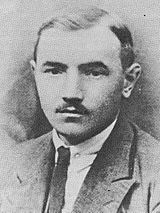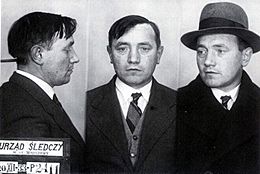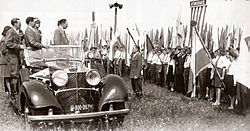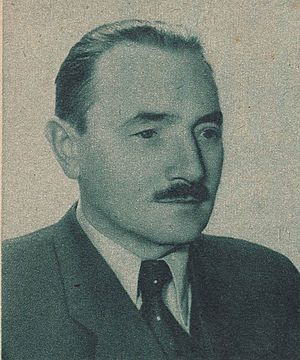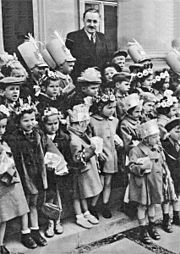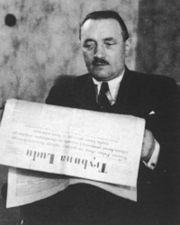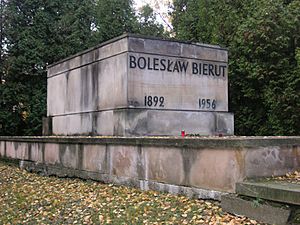Bolesław Bierut facts for kids
Quick facts for kids
Bolesław Bierut
|
|||||||||||||||||||||||||||||
|---|---|---|---|---|---|---|---|---|---|---|---|---|---|---|---|---|---|---|---|---|---|---|---|---|---|---|---|---|---|
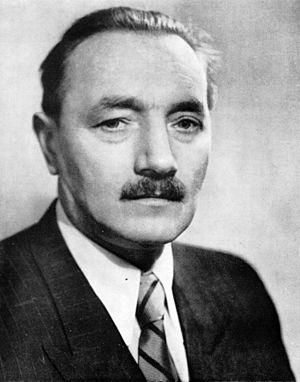
Bierut in 1950
|
|||||||||||||||||||||||||||||
| President of Poland | |||||||||||||||||||||||||||||
| In office 5 February 1947 – 20 November 1952 |
|||||||||||||||||||||||||||||
| Prime Minister | Józef Cyrankiewicz | ||||||||||||||||||||||||||||
| Preceded by | Władysław Kowalski (Acting) | ||||||||||||||||||||||||||||
| Succeeded by | Office abolished Aleksander Zawadzki as Chairman of the Council of State |
||||||||||||||||||||||||||||
| General Secretary of the Polish United Workers' Party | |||||||||||||||||||||||||||||
| In office 3 September 1948 – 12 March 1956 |
|||||||||||||||||||||||||||||
| President | Himself (until 1952) | ||||||||||||||||||||||||||||
| Prime Minister | Józef Cyrankiewicz | ||||||||||||||||||||||||||||
| Chairman | Aleksander Zawadzki | ||||||||||||||||||||||||||||
| Preceded by | Władysław Gomułka as Secretary of the Polish Workers' Party |
||||||||||||||||||||||||||||
| Succeeded by | Edward Ochab as First Secretary |
||||||||||||||||||||||||||||
|
|||||||||||||||||||||||||||||
| Personal details | |||||||||||||||||||||||||||||
| Born | 18 April 1892 Rury, Lublin, Congress Poland |
||||||||||||||||||||||||||||
| Died | 12 March 1956 (aged 63) Moscow, Russian SFSR, Soviet Union |
||||||||||||||||||||||||||||
| Political party | PZPR | ||||||||||||||||||||||||||||
| Other political affiliations |
PPS–L (1910–1918) KPP (1918–1938) PPR (1942–1948) |
||||||||||||||||||||||||||||
| Spouse | Janina Górzyńska-Bierut (1890–1985) | ||||||||||||||||||||||||||||
| Signature | |||||||||||||||||||||||||||||
| a. Polish Workers' Party to 22 December 1948. | |||||||||||||||||||||||||||||
Bolesław Bierut (born 18 April 1892 – died 12 March 1956) was a Polish politician. He was a key leader of the Polish People's Republic from 1947 until his death in 1956. Bierut held many important roles. He was President of the State National Council from 1944 to 1947. He also served as President of Poland from 1947 to 1952. From 1948 to 1956, he was the General Secretary of the Polish United Workers' Party. Later, he became Prime Minister of Poland from 1952 to 1954.
Bierut was mostly self-taught. He helped set up a strict system of government in Poland. This system was similar to the one in the Soviet Union at the time. Along with Władysław Gomułka, Bierut played a big part in the changes Poland went through after World War II. He was the only communist leader of Poland who stayed in power until he died.
Born near Lublin, Bierut started in politics in 1912. He joined the Polish Socialist Party. Later, he became part of the Communist Party of Poland. He spent some years in the Soviet Union, working with international communist groups. He studied at special schools there. In 1935, he was sent to prison in Poland for his political activities.
Even though he only went to elementary school for a few years, Bierut loved learning. He became interested in economics. He also took courses at the SGH Warsaw School of Economics. He joined a cooperative movement when he was young. After prison in 1938, he worked as an accountant until the war began.
During World War II, Bierut was active in the new Polish Workers' Party (PPR). He became the chairman of the State National Council (KRN). This group was set up by the PPR. When the Red Army freed eastern Poland, Lublin became the temporary capital. This happened because Bierut suggested it. He was trusted by Joseph Stalin, the Soviet leader. Bierut attended the Potsdam Conference. There, he helped make sure Poland's western border was set at the Oder–Neisse line. This gave Poland new lands that used to belong to Germany.
After the 1947 Polish elections, which were not entirely fair, Bierut became Poland's first post-war President. In 1952, a new constitution changed the government. The position of president was removed. Bierut supported strict government policies. He also promoted a specific style of art and culture called "socialist realism." His time in power was marked by strong control. The Ministry of Public Security (UB) was a powerful secret police force. It was responsible for punishing many opponents of the government. Bierut lived in the Belweder Palace. He led the Polish United Workers' Party from its main office in Warsaw. He also strongly supported rebuilding Warsaw. This included the historic district and building the Palace of Culture and Science.
Bolesław Bierut died on 12 March 1956 in Moscow. He had a heart attack after attending a big meeting of the Soviet Communist Party. His death was sudden, leading to many theories about it. His body was brought back to Poland. He was buried with honors at the Powązki Military Cemetery.
Bierut's Journey to Leadership
Early Life and Education
Bierut was born in Rury, Congress Poland. This area was then part of the Russian Empire. Today, it is part of Lublin. His parents, Wojciech and Marianna Salomea Bierut, were farmers. He was the youngest of six children. In 1900, he started elementary school in Lublin. In 1905, he was removed from school for taking part in protests against Russian rule.
From age fourteen, he worked in different jobs. But he kept learning on his own. He was influenced by Jan Hempel, a leftist thinker. Before World War I, Bierut joined the Polish Socialist Party – Left.
From 1915, Bierut was active in the cooperative movement. This movement helped people work together to buy and sell goods. In 1916, he became a trade manager. By 1918, he was a top leader in the Lublin Food Cooperative. During World War I, he studied trade and cooperative courses in Warsaw. He also met Maria Koszutska there. In December 1918, he joined the new Communist Workers' Party of Poland. His political views became more radical. This led him to leave the cooperative leadership in 1921. From 1921, he was officially a member of the Communist Workers' Party.
In July 1921, Bierut married Janina Górzyńska. She was a preschool teacher. She helped him when he had to hide from the police. They had a daughter, Krystyna, in 1923. Their son, Jan, was born in 1925.
Communist Party Work Before 1939
From 1922 to 1925, Bierut was part of the Communist Workers' Party's Central Committee. He worked as an accountant in Warsaw. In 1923, he was sent to manage a workers' cooperative. He lived in Sosnowiec with his family. There, he was arrested for the first time. He was arrested many times in different places. In 1925, he became a full-time party activist. He led the Cooperative Department of the Central Committee.
From 1925 to 1926, Bierut went to Moscow. He trained at a secret school of the Communist International. He was trusted by the Soviets and spoke Russian well.
In January 1927, he was arrested in Warsaw. He was released in April. In November, the party sent him back to Moscow. He attended the International Lenin School. He was seen as a good student.
From 1930 to 1931, Bierut worked for the Comintern in other European countries. He was an instructor there. He met Małgorzata Fornalska, another party activist, in Moscow. They had a daughter, Aleksandra, in 1932. Soon after, Bierut returned to Poland.
For several months, Bierut was a party secretary in Łódź. In 1933, he became secretary of the Polish section of the International Red Aid. On 18 December 1933, Bierut was arrested again. In 1935, he was sentenced to seven years in prison. While in prison, he was removed from the party. This was for his behavior during his trial. However, this decision was later reversed.
He was released from prison on 20 December 1938. He lived with his family and worked in Warsaw until the war began. Being in prison may have saved his life. While he was locked up, many other communist leaders were killed in the Soviet Union.
During World War II
On 1 September 1939, Nazi Germany attacked Poland. Bierut left Warsaw and went east. Eastern Poland was soon taken over by the Red Army. Bierut spent part of World War II in the Soviet Union. From October 1939, he worked for the Soviets in political roles. This included helping with elections in the newly taken Polish territories.
Bierut spent 1939, 1940, and early 1941 in the Soviet Union. He worked in Kiev and Moscow. He also tried to clear his name as a communist. He looked for Fornalska, whom he met in Moscow in 1940. In June 1941, Germany attacked the Soviet Union. Fornalska and her daughter were moved to safety. Bierut ended up in Minsk. From November 1941, he worked for the German occupation authorities there. He managed trade and food distribution.
In the summer of 1943, Bierut arrived in Nazi-occupied Poland. He was likely sent there by the Soviets. He joined the leadership of the Polish Workers' Party (PPR). This new communist party was founded in 1942. Bierut became a member of the party Secretariat in November 1943.
Leading the Polish Workers' Party
When Bierut arrived in Warsaw, he joined the PPR Central Committee. The Secretariat had three members: General Secretary Paweł Finder, Franciszek Jóźwiak, and Władysław Gomułka. Bierut and Gomułka quickly became rivals.
In November 1943, Finder and Fornalska were arrested by the Gestapo. They were executed in July 1944. They were the only ones who knew the radio codes to talk with Moscow. So, communication was stopped for months. On 23 November 1943, the PPR chose Gomułka as its general secretary.
However, on 31 December 1943, Bierut took another important role. He became chairman of the State National Council (KRN). This was a communist-led group set up by Gomułka and the PPR. The KRN was declared Poland's wartime parliament. Bierut, Gomułka, and others played a key role in setting up communist Poland.
In May 1944, a KRN group flew to Moscow. They met Joseph Stalin at the Kremlin. Stalin recognized the KRN as the main Polish authority.
In June 1944, Bierut wrote a letter to the Soviet leadership. He accused his rival Gomułka of being too controlling. He also said Gomułka did things against communist rules. If taken seriously, these accusations could have been very dangerous for Gomułka. But they were not, and Gomułka only found out about the letter later.
In July 1944, the Polish Committee of National Liberation (PKWN) was formed in Lublin. Just before the Warsaw Uprising, Bierut arrived in Lublin. He crossed the front line to reach the PKWN headquarters.
In Soviet-Influenced Poland
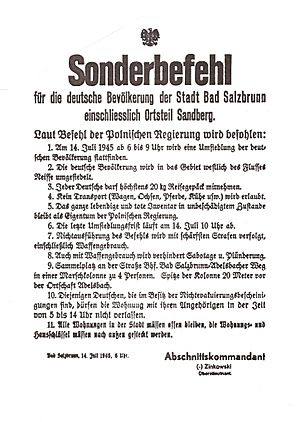
Bierut remained the KRN president. From August 1944, he was also a secret member of the PPR's new Politburo. Publicly, he was presented as a non-party politician.
After the Warsaw Uprising began, Bierut went to Moscow. In August 1944, he met with Prime Minister Stanisław Mikołajczyk of the Polish government-in-exile. Mikołajczyk refused their offer to be prime minister in a coalition government. This government would have been controlled by communists. Bierut's daughter Krystyna was a soldier in the uprising. She was badly wounded.
A KRN and PKWN group, led by Bierut, went to Moscow in September 1944. Stalin met with them. He was unhappy that they were not moving fast enough with land reform. This reform would take land from large owners and give it to farmers. Stalin told them to act quickly. Bierut felt these remarks were aimed at him.
On 12 October, the KRN met in Lublin for the first time. The meeting stopped for a religious service and a military parade. Leading communist politicians took part in religious ceremonies for a while. This showed that they officially supported religious freedom. Bierut supported moderate policies. He believed the opposition party's proposals would fail if they won.
In October 1944, a military department was created within the PPR Central Committee. Bierut and Gomułka were part of it. Their goal was to influence the armed forces. They wanted to create a loyal officer group. Bierut and Gomułka are both seen as responsible for the punishment of many former soldiers after the war. These policies were very strict from 1944 to 1948. They targeted those who opposed the government.
In February 1945, the Yalta Conference took place. Around this time, Bierut and other Polish leaders moved to Warsaw. The city was in ruins. Rebuilding it became a major focus for Bierut in the following years.
In June 1945, the Provisional Government of National Unity was formed in Moscow. In July, Bierut and other Polish leaders went to the Potsdam Conference. There, they worked with Stalin to set Poland's western border at the Oder–Neisse line. This gave Poland its largest possible new territories.
Referendum, Elections, and Bierut's Presidency
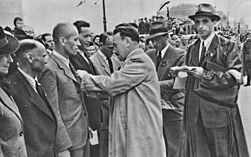
On 30 June 1946, a national referendum took place in Poland. This was to prepare for the national elections. The referendum asked three questions. The answers were supposed to show public support for the communists. However, the results were changed.
The legislative elections were held on 19 January 1947. The PPR-led group, called the Democratic Bloc, ran against Mikołajczyk's party. The election campaign was filled with fear. More than 80% of the votes were falsely reported for the Democratic Bloc. This almost removed the opposition party.
The new parliament, called the Sejm, met on 4 February 1947. The next day, it elected Bierut as President of the Republic of Poland. The ceremony was traditional. The new president even said, "so help me God."
On 16 November 1947, President Bierut gave a speech in Wrocław. He spoke about spreading culture. He said that art and culture should reflect the big changes the nation was going through. He called for more control and planning in culture and art. He believed it should shape and educate society. This speech showed that "socialist realism" would become the norm in Poland.
Sometimes, Bierut spoke directly to Stalin. He often asked Stalin and Lavrentiy Beria about Polish communists who had disappeared. Many of them were killed in the 1930s. He also looked for Fornalska's missing family. Even though Stalin and Beria did not encourage him, Bierut's efforts sometimes helped. Besides communists, Bierut also helped many other Poles return home. This included former soldiers who were exiled in the Soviet Union.
Bierut was a polite man. His wife, Janina, did not live with him. She was not well-known to his colleagues. His children, however, saw him often. They spent holidays and vacations with him. Bierut seemed to enjoy their company. After Fornalska's arrest, Wanda Górska was Bierut's partner. She worked as his secretary. She controlled who could see him. Many visitors thought she was his wife.
Leading Stalinist Poland
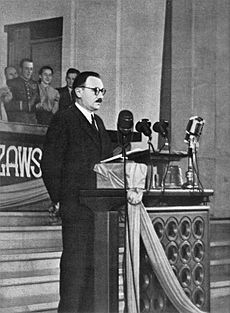
In August 1948, Gomułka, the general secretary of the PPR, was removed from his position. He was accused of having "right-wing nationalistic" views. This was planned by Stalin. Stalin chose President Bierut to take Gomułka's place. Bierut became both the top party leader and the top state official.
The historic Polish Socialist Party joined with the PPR in December 1948. This created the Polish United Workers' Party (PZPR). This party was very powerful in the state. Bierut became its first general secretary. The Three-Year Plan for rebuilding Poland ended in 1949. It was followed by the Six-Year Plan. This plan focused on making Poland more industrial. It also led to many cities growing larger.
In November 1949, Bierut asked the Soviet government for Marshal Konstantin Rokossovsky. Rokossovsky was a Polish-Soviet general. He became a Marshal of Poland and the Minister of National Defense.
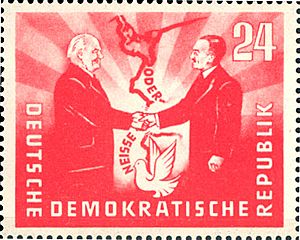
In August 1951, Bierut had his main rival Gomułka and his wife arrested. Gomułka was in prison but refused to cooperate. He defended himself well. Bierut's team struggled with the case. However, some say that Stalin and Beria ordered the arrest. Bierut and Jakub Berman tried to protect Gomułka and caused delays. After Stalin's death, political reforms began. Gomułka was released in December 1954.
While Stalin was alive, Bierut followed his orders closely. Bierut often received instructions from Stalin by phone. He was also called to Moscow for meetings. But Bierut had more power in Poland than any of his later successors. He ruled with his two closest helpers, Berman and Hilary Minc. He also discussed security issues, like punishing opponents, with Stanisław Radkiewicz, the head of the security ministry.
Bierut's 60th Birthday and the New Constitution
Bierut's popularity was strongly promoted by the government for years. The biggest celebration was his sixtieth birthday on 18 April 1952. Factories and individuals made special promises to produce more or achieve goals. The University of Wrocław and some state companies were named after him. The party's Central Committee prepared a special book about Bierut's life. Polish poets wrote poems for him. Many postage stamps were also issued in his honor.
The PZPR leaders wanted to create a new constitution. On 26 May 1951, the Sejm passed a law about preparing the constitution. The committee, led by Bierut, started its work in September. In late 1951, Stalin reviewed a Russian translation of the draft. He made many changes, which Bierut then put into the Polish text. The public discussion led to hundreds of other suggested changes. After delays, the Constitution of the Polish People's Republic was officially announced on 22 July 1952.
The country was renamed the Polish People's Republic. The Sejm was made the highest authority. It represented "the working people of towns and villages." The president's job was removed. It was replaced by the Polish Council of State, a group elected by the Sejm. Aleksander Zawadzki was the first chairman of this new council. Bierut became prime minister in November 1952, replacing Józef Cyrankiewicz. This constitution was changed many times. It stayed in use until a new one came into effect in 1997.
Bierut's Final Years
In March 1953, Bierut led the Polish group to Stalin's funeral in Moscow.
The government's relationship with the Catholic Church got worse. The authorities imprisoned Bishop Czesław Kaczmarek. They also held Poland's top church leader, Cardinal Stefan Wyszyński.
In the Soviet Union, new changes began under the new leader, Nikita Khrushchev. The idea of "collective leadership" spread to other communist countries, including Poland. This meant that different officials would hold the top party and state jobs.
The Second Congress of the PZPR met from 10 to 17 March 1954. Bierut's title changed from general secretary to first secretary. Because of the new rule about separating jobs, Bierut remained only a party secretary. Cyrankiewicz returned to being prime minister. The Six-Year Plan was changed. Some money for heavy industry was moved to making consumer goods.
When Khrushchev visited the congress, he asked why Gomułka was still in prison. Bierut said he did not know.
Death and Funeral
The 20th Congress of the Communist Party of the Soviet Union met from 14 to 25 February 1956. After the meeting, Bierut did not return to Poland with his group. He stayed in Moscow because he was sick with the flu. This turned into pneumonia and heart problems.
On 3 March, some party members in Warsaw criticized the current leadership, including Bierut.
Bierut died of a heart attack on 12 March 1956. He had read Nikita Khrushchev's "Secret Speech." In this speech, Khrushchev criticized Stalin's leadership style.
Bierut died sixteen days after that speech. Some Polish students who met him on 25 February 1956 said he already looked unwell then.
Bierut was given a grand funeral in Warsaw. A period of national mourning was announced. Catholic bishops agreed to ring church bells across the country on the day of the funeral.
On 14 March, Helena Jaworska spoke on the radio. She praised Bierut on behalf of Polish youth. She talked about his work during and after the war. She called him "the beloved friend of the youth" and "a beautiful, loved person."
The funeral took place on 16 March. Polish Radio broadcast it for many hours. Warsaw residents had a day off work to attend. Large crowds joined the funeral procession. It started at the Palace of Culture and Science. It went to the Powązki Military Cemetery. Only invited guests could enter the cemetery.
Bierut's Legacy in Poland
Khrushchev, who attended Bierut's funeral, stayed in Warsaw for several days. He attended a meeting of the PZPR Central Committee. On 20 March, Edward Ochab was chosen as the party's new first secretary. Prime Minister Cyrankiewicz gave a detailed report on Bierut's illness. This report was not made public.
Some historians believe Bierut's death helped other political changes happen. If he had lived longer, the process of moving away from Stalin's strict rule might have been slower.
Soon after Bierut's death, on 18 April 1956, a new ship was named Bolesław Bierut.
During Gomułka's time as first secretary (1956–1970), Bierut's memory was not emphasized. After 1970, First Secretary Edward Gierek brought Bierut back into public attention. Some books about him were published. In July 1979, a monument to Bierut was built in Lublin. Bierut's image was kept alive in the 1970s. Gierek and his team saw Bierut's time as a good period. They brought in a softer version of the strict system.
During the brief but active Solidarity period, the University of Wrocław tried to get its original name back. But the Ministry of Higher Education did not allow it in January 1982.
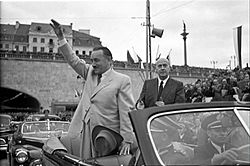
On 1 June 1987, a factory was named after Bierut. This was likely the last time something was named after him. In 1989, the University of Wrocław got its old name back. Bierut's monument in Lublin was removed. Soon, all public mentions of Bierut were taken down. Many other monuments and names linked to the communist era were also removed.
Historian Zenobiusz Kozik wrote about Bierut's important role. He said Bierut was part of big social and economic changes. These changes led to fast economic growth and cultural progress for many people, especially young people. He noted that this happened despite some negative effects.
Another historian, Jerzy Eisler, pointed out the other side. He mentioned the harsh treatment of those who sought independence. He also noted the unfair trials and the changed election results. He spoke of the "Sovietization" of Poland. This means Poland became very similar to the Soviet Union in many ways.
Stanisław Szwalbe said that Bierut believed every big social change had to have victims, even innocent ones. Bierut saw himself as a student of Stalin. He thought it was okay to hide the truth and remove opponents.
Historians Eleonora and Bronisław Syzdek said Bierut did not seem like a dictator. They said he knew how to listen and speak well. This was true even though he only had five years of elementary school. He learned a lot by teaching himself. People who worked closely with Bierut still remember him kindly. They try to defend him against negative views.
Leon Chajn described Bierut as "refined, tactful, composed." He said Bierut was not a genius but valued intelligence in others. He called him a "great patriot" who liked Stalin's ideas but not his methods. Stanisław Łukasiewicz wrote that Bierut "always read a lot and wrote a lot, especially in prison. The years spent in prison were for him the period of his university studies."
Awards and Honors
 Order of the Builders of People's Poland
Order of the Builders of People's Poland Order of the Cross of Grunwald (1st class)
Order of the Cross of Grunwald (1st class) Partisan Cross
Partisan Cross Medal of Victory and Freedom 1945
Medal of Victory and Freedom 1945 Medal for Warsaw 1939–1945
Medal for Warsaw 1939–1945
See also
 In Spanish: Bolesław Bierut para niños
In Spanish: Bolesław Bierut para niños
- Bierut Decree
- Bierut Decrees
 | Mary Eliza Mahoney |
 | Susie King Taylor |
 | Ida Gray |
 | Eliza Ann Grier |


